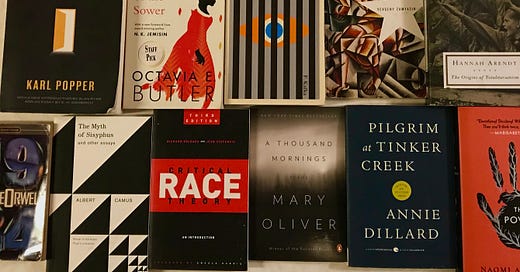Epigraphs All the Way Down (2022)
The study of texts should provoke thinking and conversation; resist censorship.
For a while I could not remember some word I was in need of,
and I was bereaved and said: where are you, beloved friend?
—Mary Oliver1, “After I Fall Down the Stairs at the Golden Temple
As an English teacher, I believe that we read and write to make meaning, not merely to receive it. The quotes below, which headed various pieces I wrote during 2022, helped me to make meaning this year, and this year presented me with significant challenges in making meaning.
Reading back through these short (and not-so-short) excerpts, I recognize unexpected wisdom and connections in many of them which I didn’t see when I first quoted them. Sometimes, fragments of these quotes seemed to seep up out of my unconscious mind for no reason, only to reveal their purposes later. This is the conversation with texts that helps synthesize new meaning.
This ongoing conversation with texts is essential to a free society. Openness comes from what the courts sometimes call “the marke…
Keep reading with a 7-day free trial
Subscribe to Other Duties (as assigned) to keep reading this post and get 7 days of free access to the full post archives.




